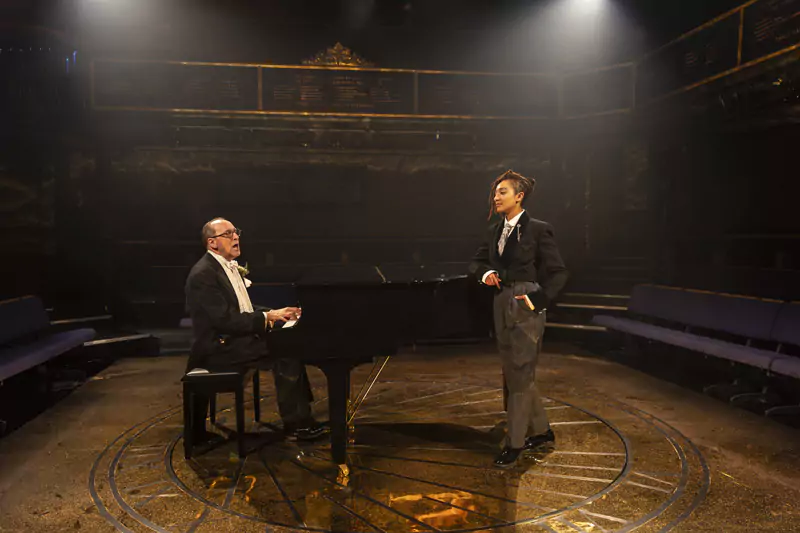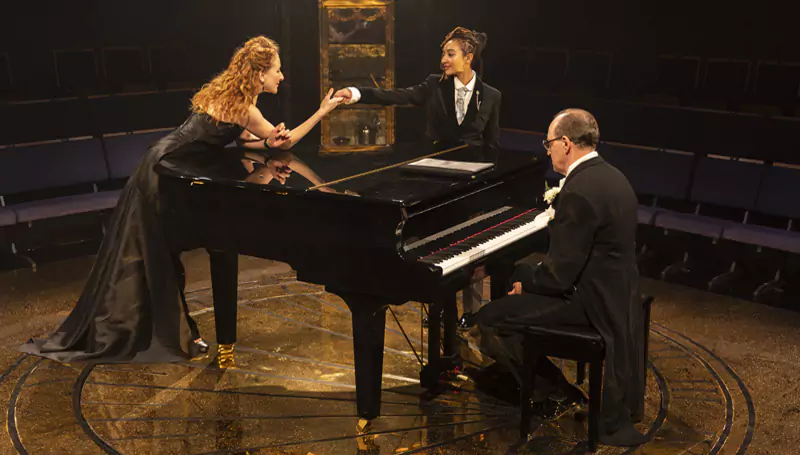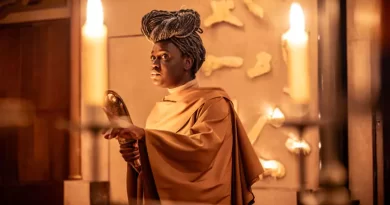“Twelfth Night” at Orange Tree Theatre
Jeremy Malies in south-west London
2 December 2024
Orson Welles described Illyria as “a comedy climate where anything can happen”. However brilliant, maybe this one has some parameters since it’s a country house environment based around the piano-playing of composer-actor Stefan Bednarczyk as Feste. His concert grand is centre stage throughout.

Tom Kanji, Stefan Bednarczyk and Patricia Allison.
Photo credit: Ellie Kurttz.
Apart from some Bach and Mendelssohn, the music is all Bednarczyk’s own compositions (lyrics by Shakespeare or his collaborator) in a Cole Porter–Hoagy Carmichael style and with a blast of Fats Waller during the interval. This is a knowing Feste who is pulling multiple strings including vicious taunting and sensory deprivation of Malvolio (Oliver Ford Davies) at the end. I was reminded of what a cruel play this is and seldom has Malvolio’s threat of revenge been spat out with such venom.
There are touches of P.G. Wodehouse, particularly in Robert Mountford’s presentation of Sir Andrew Aguecheek as a monied fop on whom Sir Toby Belch (Clive Francis) predates financially. Aguecheek might be a buffoon who is looking to punch above his weight by courting Olivia, but Mountford renders him unusually affecting with the plaintive line, “I was adored once too.”
Francis shows Belch to be truly pathetic here as he makes an exit with mutterings that say much about the abject alcoholic’s need to drink until blackout and constant worry about supply. Will his niece’s wine cellar run to this?
However much I respect Oliver Ford Davies as a character actor, I wondered about his casting here as Malvolio. The steward’s romantic aspirations towards lady of the house Olivia (Dorothea Myer-Bennett) must of course be ludicrous but here the age difference is so huge that the comedy as he daydreams about their sensuous married life together borders on the sordid.
Belch and Malvolio spar constantly. And you know that the puritanical steward who preaches about moral rectitude but covets a young wealthy aristocrat is the real hypocrite here. Francis (chest covered in medals for gallantry) lands one of his insults and rejections of puritanism with aplomb as he barks, “Dost thou think, because thou art / virtuous, there shall be no more cakes and ale?”

Stefan Bednarczyk and Patricia Allison.
Photo credit: Ellie Kurttz.
Director Tom Littler conjures up the same post-Second World War atmosphere that he used at the Orange Tree for She Stoops to Conquer. Set designers Anett Black and Neil Irish (they are also responsible for costumes) have the base of all four galleries as a roll of honour showing the names of real war fatalities whose families have co-operated. And the revolve (even the piano spins!) reminds us that Shakespeare’s focus here is “the whirligig of time”. I did wonder about sound designer Matt Eaton’s extended use of loudly chiming bells and empathised with a fellow critic who groaned, “A train and two tubes to get here. Now this. Sometimes you can have enough ambient noise!”
Tom Kanji shows technical skill in extracting more than is usual from Orsino. It’s nonsense to say that this is a wet or underwritten part. Shakespeare realizes the need for distinct personality types and deliberately contrasts the chirpy characters elsewhere with a recluse who is so staid that he woos by proxy (thus setting the plot in motion).
Kanji shows Orsino realizing that there is passion standing by his side from a sexually ambiguous boy (Patricia Allison playing Viola-Cesario) and conveys his confusion and attraction effectively. Littler brings the pair through the extra level of homoeroticism as Kanji asks Allison whether, if he were a woman, what kind of man might appeal to him, and she says that it would be a man of his complexion. Later, Allison’s eyes swim with tears at the intense lesbian overtones (from Viola’s perspective at least) as Myer-Bennett shows a longing for her. The pair are tactile.
Littler deals with the eavesdropping scene adeptly by putting Malvolio’s tormentors on the benches with the spectators. The elfin Jane Asher, as plotter-in-chief Maria, moves around the theatre and even squeezes herself between the legs of a camera tripod. The single-set house interior means the off-stage shipwreck has to be underplayed, though Corey Montague-Sholay as Antonio has a tang of sea air to him in his piratical coat.
There is no scope for the usual heart-wrenching moments when the twins (Sebastian is played with invention by Tyler-Jo Richardson) miss each other by split seconds and almost feel each other’s presence. Yet at one moment I was moved by the suggestion that Allison had seen her twin’s reflection on the burnished spotlit metal floor (lighting by William Reynolds) but dismissed it as her own shadow.
Feste is sometimes cast as a Buddhist, a shaman, or some kind of eccentric existing on the fringe of the mainstream. Here he is at the centre of the social set and, with Bednarczyk to an extent improvising, this will have a different flavour and momentum on each night. The subtitle of the play is “What You Will”. Littler always does what he wills with plays, and here he has created a production that is fresh, sexy, and unafraid of risk. The venue has another hit on its hands.









